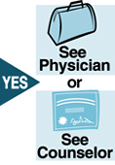Stress
Stress is the body’s response to any increased demand. It does not matter
whether the demand is caused by pleasant or unpleasant things. It does not
matter whether it results in good or bad things.
Marriage or divorce, job loss or the threat of being fired, even the
disappointment of doing poorly on an exam, all create stress. So do
countless other situations.
Inside, your body reacts to stress by preparing to do something (e.g.,
fight, kick, scream, cry, run away). But in most situations, none of these
options are acceptable.
Symptoms
Physical Symptoms
 |
Increased heart rate |
 |
Rapid breathing |
 |
Tense muscles |
 |
Increased blood pressure |
Emotional Reactions
 |
Irritability |
 |
Anger |
 |
Losing one’s temper |
 |
Yelling |
 |
Lack of concentration
|
 |
Being jumpy |
When left unchecked, stress can lead to a variety of health problems
including:
 |
Insomnia |
 |
Back pain |
 |
High blood pressure |
 |
Heart disease
|
 |
A lowering of the body’s immune
system. In fact, the American Academy of Family Physicians states
that about two-thirds of all visits to the family doctor are for
stress-related disorders. |
|
 |
Questions to Ask
Do you have either of these problems?
- You are so distressed that you have recurrent thoughts
of suicide or death.
- You have impulses or plans to commit violence.
|
 |
|

|
|
Do you have any of these problems often?
- Anxiety
- Nervousness
- Crying spells
- Confusion about how to handle your problems
|
 |
|

|
|
Are you abusing alcohol and/or drugs (illegal or prescription)
to deal with stress?
|
 |
|

|
|
Have you been a part of a traumatic event in the past (e.g.,
armed combat, airplane crash, rape or assault) and do you now
experience any of the following?
- Flashbacks (reliving the stressful event), painful
memories, nightmares
- Feeling easily startled and/or irritable
- Feeling “emotionally numb” and detached from others and
the outside world
- Having a hard time falling asleep and/or staying asleep
- Anxiety and/or depression
|
 |
|

|
|
Do you withdraw from friends, relatives and co-workers and/or
blow up at them at the slightest annoyance?
|
 |
|

|
|
Do you suffer from a medical illness that:
- You are unable to cope with
- Leads you to neglect proper treatment
|
 |
|

|
|
|

|
|
Being able to manage stress is important in living a healthy, happy and
productive life. Here are some techniques and strategies to help you deal
with stress:
 |
Maintain a regular program of healthy
eating, good health habits and adequate sleep. |
 |
Exercise regularly. |
 |
Balance work and play. All work and no
play can make you feel stressed. Plan some time for hobbies and
recreation. These activities relax your mind and are a good respite
from life’s worries. |
 |
Help others. We concentrate on
ourselves when we’re distressed. Sometimes helping others is the
perfect remedy for whatever is troubling us. |
 |
Take a shower or bath with warm water.
This will soothe and calm your nerves and relax your muscles. |
 |
Have a good cry. Tears of sadness, joy
or grief can help cleanse the body of substances that accumulate
under stress and also release a natural pain-relieving substance
from the brain. |
 |
Laugh a lot. When events seem too
over-whelming, keep a sense of humor. Laughter makes our muscles go
limp and releases tension. It’s difficult to feel stress in the
middle of a belly laugh. Learn to laugh as a relaxation technique. |
 |
Find ways to learn acceptance.
Sometimes a difficult problem is out of your control. When this
happens, accept it until changes can be made. This is better than
worrying and getting nowhere. |
 |
Talk out troubles. It sometimes helps
to talk with a friend, relative or member of the clergy. Another
person can help you see a problem from a different point of view. |
 |
Escape for a little while. When you
feel you are getting nowhere with a problem, a temporary diversion
can help. Going to a movie, reading a book, visiting a museum or
taking a drive can help you get out of a rut. Temporarily leaving a
difficult situation can help you develop new attitudes. |
 |
Reward yourself. Starting today,
reward yourself with little things that make you feel good. Treat
yourself to a bubble bath, buy the hardcover edition of a book, call
an old friend long distance, add to your stamp or coin collection,
buy a flower, picnic in the park during lunchtime, try a new perfume
or cologne or give yourself some “me” time. |
 |
Do relaxation exercises daily. Good
ones include visualization (imagining a soothing, restful scene),
deep muscle relaxation (tensing and relaxing muscle fibers),
meditation and deep breathing. |
 |
Budget your time. Make a “to-do” list.
Rank in priority your daily tasks. Avoid committing yourself to
doing too much. |
 |
Avoid procrastination so you are not
left with a lot of work to do at one time. |
 |
View changes as positive challenges,
opportunities or blessings. |
 |
Do a stress rehearsal by practicing
for stressful events. Imagine yourself feeling calm and confident in
an anticipated stressful situation. You will be able to relax more
easily when the situation arises. |
 |
Modify your environment to get rid of
or manage your exposure to things that cause stress. |
 |
Remember that nothing is either good
or bad, but thinking makes it so. Therefore, it is not an event that
causes stress, but rather what you say to yourself about the event.
The ABCDE Model can help you
change your thoughts about an event and help manage stress. |
 |
Use the Thought Zapper technique for
stress producing thoughts. (See Steps 1 through 4 under “Use a
Thought Zapper”.) |
|
 |
|








